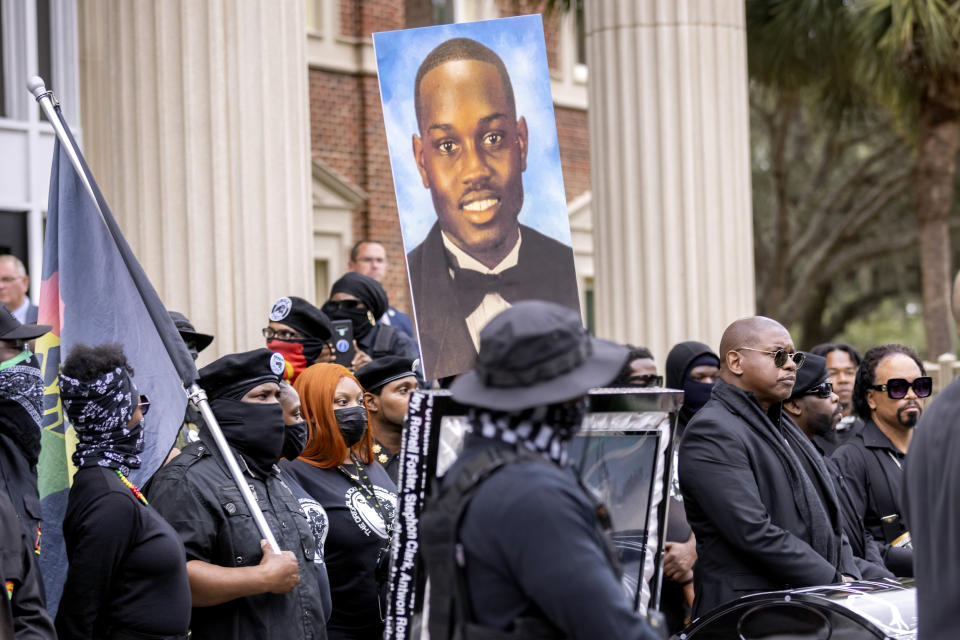Jury deliberates in murder trial of 3 men in Ahmaud Arbery's killing
The verdict in the trial of three white men accused of murder and other crimes in the shooting death of Ahmaud Arbery, a Black man, is now in the hands of 12 jurors after prosecutors made final closing arguments Tuesday morning.
The three men each face charges of malice murder, felony murder, aggravated assault, false imprisonment and criminal attempt to commit a felony in the killing of Arbery, 25, last year in Georgia.
They face up to life in prison if convicted of the more serious charges.
Travis McMichael; his father, Gregory McMichael; and their neighbor William “Roddie” Bryan chased Arbery in pickup trucks after they spotted him in their neighborhood outside Brunswick, Georgia, on Feb. 23, 2020.
Travis McMichael shot Arbery, 25, with a shotgun at close range. Bryan filmed the fatal encounter on his cellphone.
A nearly all-white jury — it includes one Black juror — will determine their fate. Jurors deliberated for about six hours on Tuesday without reaching a verdict. They will resume deliberations Wednesday at 8:30 a.m. local time.

Defense lawyers have said the men suspected Arbery, who had been spotted several times on security camera video at a home under construction in the neighborhood, was a burglar. The lawyers said the men were trying to conduct a citizen’s arrest, which was legal in the state at the time.
“A good neighborhood is always policing itself,” Laura Hogue, an attorney for Gregory McMichael, told jurors Monday during closing arguments. Each defendant has his own defense team.
But prosecutors have argued that the men had no “immediate knowledge” of Arbery having committed a crime, a requirement of a citizen’s arrest. Lead prosecutor Linda Dunikoski said the men made the decision to “attack” because Arbery “was a Black man running down the street,” and not because he was a threat.
Superior Court Judge Timothy Walmsley instructed the jury Tuesday that a "private citizen’s warrantless arrest must occur immediately after the perpetration of the offense, or in the case of felonies during escape.”
“If the observer fails to make the arrest immediately after the commission of the offense, or during escape in the case of felonies, his power to do so is extinguished,” he said.
The judge ruled Friday afternoon that under Georgia’s since-repealed citizen’s arrest law, the one applied in this case, the arrest would have to occur right after any felony crime was committed, not days or months later.
Travis McMichael testified during the trial that he feared for his life before he shot Arbery and did so in self-defense.
Jason Sheffield, who represents Travis McMichael, said Monday that his client had “the right to perform a citizen’s arrest” and believed Arbery committed the crime of burglary.
“You do have the right to have a firearm when you make an arrest,” Sheffield said. “You do have the right to stop a person and to hold them and detain them for the police. And there is risk with that and there are tragic consequences that can come from that.”
Kevin Gough, the attorney for Bryan, sought to separate his client from the McMichaels and diminish his role in the father and son's encounter with Arbery.
“Mr. Bryan’s presence doesn’t contribute in a direct or substantial way to the death of Mr. Arbery,” Gough said. “Because the McMichaels were certainly capable of catching up with him and shooting if that was their intention.”
Walmsley instructed jurors that they may consider simple assault, reckless conduct and reckless driving as lesser charges to aggravated assault for Bryan.
Prosecutors have argued that all three men made a snap judgment about Arbery after seeing him in their neighborhood, with the McMichaels going to confront him with guns and Bryan wielding his truck as a weapon.
The state has also said the men were the initial aggressors and not acting in self-defense.
“They committed four different felonies, including the aggravated assault with a shotgun. They started it, they do not get to claim self defense,” Dunikoski said Tuesday morning during a second day of closing arguments.
She said the men were not justified in claiming they were making a citizen’s arrest of Arbery because they did not witness him commit any crime nor did they have immediate knowledge he had just committed a crime.
She said if the jurors found the men did not have the right to make a citizen’s arrest of Arbery, “that means they’re guilty on all charges.”
“They’re all equally responsible for the ultimate death of the victim,” she said.
Dunikoski said the case was not about whether the three defendants were “good people or bad people.”
“It’s about holding people accountable and responsible for their actions. When they do something like this, they have to be held accountable and responsible,” she said.
Outside the courthouse, an attorney for the Arbery family said they were confident the jurors would reach a guilty verdict.
"We’re confident that this jury will seriously consider all the evidence and come back with a verdict that is reflective of what actually happened, which is the brutal and unjustified murder of Ahmaud Arbery," attorney Lee Merritt said.

